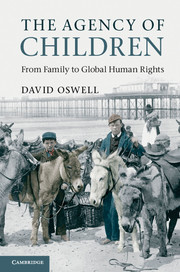Book contents
3 - Modern social theories: agency and structure
Published online by Cambridge University Press: 05 April 2013
Summary
By and large, sociologists of childhood have, whether explicitly or implicitly, held the focus of their study on children with speech and from school years and above. The questions of agency and power, culture and interpretation, politics and rights have largely, but not exclusively, been oriented to those children in their mid to late years, rather than to infants (in the literal sense of those with no speech). Many sociologists of childhood take Durkheim’s lead and discuss what he refers to as ‘childhood in the usual sense of the word’ (Durkheim, 1979: 149). And yet some sociologists, notably Priscilla Alderson, have argued that any sociology of childhood needs to include those younger children, infants and babies, as well as the older ones (Alderson, 2000). Indeed, the question of infancy has been at the heart of the issue, and to circumscribe a priori what constitutes the domain of study would certainly seem to jump the gun. In many ways, there is an acceptance that children are individuals and have various abilities and competencies. But it is also accepted that such individuation is a facet of development and that prior to individuation is a state of preformed human-beingness inasmuch as individuation is social individuation. A central problem, then, for sociologists of children has been not simply the question of agency, but the problem of agency as both individuated and predicated on human growth inasmuch as growth is defined as the propensity to sociality. Much of the recent sociology of childhood, certainly since the late 1980s, has sought not only to construe children (often in some indeterminate sense) as having agency (as making some impact on the world), but also to reconfigure our understanding of social structure as more open to the dynamic interactions and influences of children as agentic beings. Whereas the presumption of the immaturity of infancy has often led to a fixing of the social or ‘society’ as something imposed on those new to the social world (i.e. as socialisation), or as an inherent schema through which a propensity to normality is defined (i.e. as normal development), sociologists of childhood, in their explorations of social agency, often refuse at first base such a fixity. The intention of the sociology of childhood in the late 1980s was, in part, to find a place for children without returning to such a fixity.
- Type
- Chapter
- Information
- The Agency of ChildrenFrom Family to Global Human Rights, pp. 37 - 50Publisher: Cambridge University PressPrint publication year: 2012



